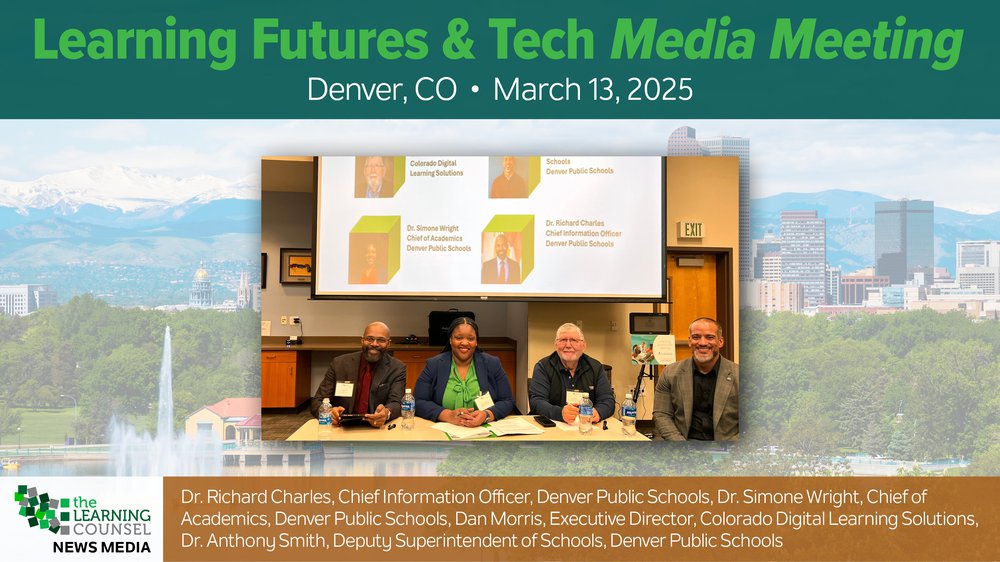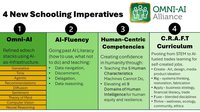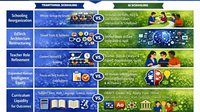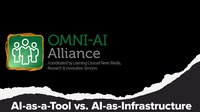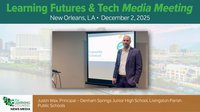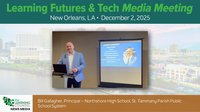At the Denver Learning Futures & Tech Media Meeting, an esteemed panel of educational leaders gathered to discuss the evolving role of artificial intelligence (AI) in education. Moderated by LeiLani Cauthen, CEO of Learning Counsel, the panel featured:
- Dr. Richard Charles, Chief Information Officer, Denver Public Schools
- Dr. Simone Wright, Chief of Academics, Denver Public Schools
- Dr. Anthony Smith, Deputy Superintendent of Schools, Denver Public Schools
- Dan Morris, Executive Director, Colorado Digital Learning Solutions
Navigating the Early Stages of AI in Education
Dr. Richard Charles emphasized that Denver Public Schools (DPS) is at the forefront of AI adoption, working alongside national organizations to develop responsible policies.
"We participated in creating guidance documents with the Council of Great City Schools and AWS," he explained. "We’re integrating AI into both instruction and operations, but also focusing on security and protecting our students."
As an applied mathematics expert, Dr. Charles acknowledged both AI’s potential and the need for caution. He highlighted the district’s work in penetration testing to ensure student data remains secure.
AI as a Transformational Teaching Tool
Dr. Simone Wright underscored the importance of building a strong AI policy before implementing it in the classroom.
"At the end of the day, we have to protect our students, staff, and families," she stated. "That’s where DPS started—by focusing on safety before jumping into instructional applications."
She shared how DPS piloted AI tools like Course Mojo, which provides real-time literacy feedback for students and teachers.
"When I saw the AI system giving teachers immediate insights into student comprehension, I thought—this could change everything," she said. "If we can scale this properly, we can ensure all kids learn effectively."
AI in Rural Schools: Unique Challenges and Approaches
Dan Morris, who works with Colorado Digital Learning Solutions, provided insight into how AI is being approached in small, rural districts—which often lack the tech infrastructure of urban districts.
"Many of our districts don’t have the ed-tech staff that Denver does," he explained. "So we started by focusing on the teachers, what do they know? What do they need to know? What are their fears?"
His team has concentrated on training educators to use AI as a personal tool before implementing it in the classroom.
"We’re avoiding rushing AI into classrooms. Instead, we’re piloting small projects and helping teachers build confidence," he said. "Right now, 50% of educators we surveyed feel unprepared and uneasy about AI, so that’s where we’re focusing our efforts."
AI, Public Perception, and the Future of Education
Dr. Anthony Smith addressed the broader societal concerns about AI, including fears of automation replacing human roles.
"We need to demystify AI for our communities and parents," he asserted. "Many people only hear about AI through dystopian media narratives. How do we counter that and show AI’s benefits?"
He pointed out that education is still fundamentally a people-centered field.
"If machine learning was the ultimate answer, my kids would be totally different," he joked. "At its core, education is about human connection. AI should enhance—not replace—that."
Looking Ahead: AI’s Rapid Evolution in Schools
The panel agreed that AI in education is evolving too quickly for anyone to claim mastery.
"We started discussing AI seriously three years ago, and we were already two years behind," Dr. Smith admitted. "Now, we're still playing catch-up. The key is to build partnerships, learn from each other, and remain flexible as AI advances."
Key Takeaways from the Panel
- Security and Ethics First – Districts must prioritize student safety and data protection before widespread AI adoption.
- Teacher Training is Crucial – Educators need time to understand AI before integrating it into classrooms.
- AI Can Reduce Workload – If used effectively, AI can help teachers spend more time on student engagement rather than administrative tasks.
- AI Must Enhance, Not Replace Human Interaction – Education remains a people-centered profession—AI should support, not diminish, the teacher-student relationship.
- Flexibility is Key – AI is advancing rapidly, and schools must remain adaptable and open to continuous learning.
As AI continues to reshape education, the Denver panel made one thing clear: thoughtful, responsible, and human-centered implementation is essential for success.
Tune in below to see the whole panel discussion.

